|
In celebration of the Fourth General Congress of the Union of the Catholic Apostolate, the Catholic Apostolate Center will share weekly homilies from the Congress. Homily for July 17, 2024 “Guide us your people, so that we may contribute to the building of a new society, at the service of the life of every person, of hope and concrete solidarity with all in different cultures” (From the Prayer for the fourth UAC General Congress) Dear Brothers and Sisters of the Pallottine Family,
Once again, we have taken another theme for our reflection from the Prayer for the fourth UAC General Congress: “Guide us your people, so that we may contribute to the building of a new society, at the service of the life of every person, of hope and concrete solidarity with all in different cultures.” As Christians, as members of the Union of Catholic Apostolate, we are invited to build a better world. We wish to be in service of life and want to work for the integral development of every human being created in God’s own image and likeness. The members of the Union of Catholic Apostolate have an immense responsibility to be missionary disciples to work hard to build up societies and communities built on the values of the Gospel. In his book “Let us Dream. The Path to a Better Future,” written during the dark days of Covid-19 (2020), Pope Francis speaks about his dream of building a better future for humanity. The Holy Father points out the absolute importance of authentic human connectedness in every sphere of life. He believes that it is time to restore an ethics of fraternity and solidarity, regenerating the bonds of trust and belonging among people, nations and cultures. The Pope also points out four elements that can block the action of the Holy Spirit – narcissism, discouragement, pessimism and indifference. The authentic manifestations of an Easter people are joy and renewed hope. We can be discouraged very often by ongoing conflicts and violence. However, the people who changed the world are those who kindled the candle of hope and courage and not those who surrender themselves to pessimism and defeatism. Our efforts as members of the Union of Catholic Apostolate to build up a better world should not be seen as only a socio-political action. One of the modern saints of our times who set in motion a revolution of fraternal charity was the tiny woman, Saint Mother Teresa. She had faith as the foundation, hope as its driving force, and charity as its goal. She was convinced from the beginning of her work with the poor that it was God’s work that she was doing, and whatever she did for anyone she did it for Jesus. It was based on faith because she was feeding Jesus in the hungry. Every human being is a child of God, to be respected and loved as such. Each human being is an embodiment of God’s love, no matter where he comes from or what religion he belongs to. What is essential to us is our common brotherhood in the one and only Fatherhood of God. St. Vincent Pallotti too had seen the hungry Christ, the thirsty Christ, the naked Christ, the homeless Christ, the sick and imprisoned Christ everywhere (cf. Matthew 25:31-36). For Pallotti, it was the continuation of the mission of compassion, the salvific work of Jesus. That was why he prayed so ardently: “I would like to become food to feed the hungry, clothing to cover the naked, drink to quench the thirsty….” (OOCCX, 115). We are blessed to have today the presence of the participants of the Central Assembly of the Pallottine Missionary Sisters. These are members of the General Council, the Provincial Superiors and delegates from all the Provinces, Regions and Delegatures of the Congregation. Recently, I received a video from Sr. Cecile, the Principal of the Pallottine School at Masaka, Tanzania. We could see the beautiful children dressed up in their school uniform. We could also see how the entire campus was maintained with great attention for the protection of our Common Home. Those who were involved in developing the School will know how much sacrifices were made in establishing the School and in offering quality education to hundreds of children. We can have many examples of such apostolic activities done by our priests, sisters and lay members around the world. In our efforts to build up a better world, particular attention needs to be given to children and vulnerable persons. We heard in today’s Gospel: “At that time Jesus exclaimed, ‘I bless you, Father, Lord of heaven and of earth, for hiding these things from the learned and the clever and revealing them to little children. Yes, Father, for that is what it pleased you to do.” (Matthew 11:25-26) These words show the unique place the little children enjoy before God and hence we need to care for them and protect them. Giving them good education brings great rewards. Today we celebrate the memory of Blessed Elizabeth Sanna, the spiritual daughter of our Founder. This handicapped mother who was outstanding in fraternal charity and holiness of life reminds us of all the vulnerable persons around the world and who need particular attention. Recently the Dicastery for Laity, Family and Life came out with a small document called “An Unlimited Joy,” based on the contributions collected during the Synod Listening Session. The question was "In a Synodal Church in mission, how can the co-responsibility of the faithful with disabilities be fostered?” A response given to this question was: “First of all, it requires attentive listening and concrete commitment on the part of every ecclesial community. In the Synodal Church everyone listens to each other and it is necessary to give conscious and qualified attention to all the faithful, without exceptions, even to those who experience disabilities, but a proactive attitude is needed on the part of everyone. In other words, our active participation in the life of the Church requires the involvement of each and every one of us.” Dear Brothers and Sisters of the Pallottine Family, we have to listen to the cry of God’s people. The Union of Catholic Apostolate, through the active and responsible participation of all its members, must continue the saving and healing mission of Jesus. Matthew 25:31-46, on the last judgment, must challenge every member. The judgment will be made on the basis of concrete love given or denied to one of the least of our brothers and sisters because Jesus himself is present in each one of them. Amen. Fr. Jacob Nampudakam, S.A.C. UAC President
0 Comments
In celebration of the Fourth General Congress of the Union of the Catholic Apostolate, the Catholic Apostolate Center will share weekly homilies from the Congress. Homily for July 10, 2024 “Grant us to be instruments of peace and love, reflecting the love of Christ in every situation” The theme for our reflection and prayer today is, once again, taken from the Prayer in Preparation for the UAC General Congress. It is a very sincere prayer from our hearts: “Grant us to be instruments of peace and love, reflecting the love of Christ in every situation.” Every Pallottine is called to be an instrument of peace and love, by reflecting the love of Christ in every possible situation.
This prayer reminds of the famous prayer of the great Saint Francis of Assisi: “Lord, make me an instrument of your peace.” It is a timeless expression of humility, love, and service to others. The prayer captures St. Francis’s commitment to peace, love and compassion, emphasizing virtues like forgiveness, understanding, and selflessness. It is also a reminder for all the members of the Union that they have to be genuinely involved in the affairs of the world. They have to be instruments of peace and love, fraternal communion and solidarity, through the exercise of forgiveness and compassion. They have to be healers and protectors of the widows and orphans. But all these things are to be done not on their own merit; they have to only reflect the love of Christ in every situation. The first reading from the book of Hosea reminds us that we can cease to be instruments of peace and love. Israel became like a luxuriant vine producing a lot of fruit. “The more his fruit increased, the more altars he built; the richer his land became, the richer he made the sacred pillars. Theirs is a divided heart; now they will have to pay for it. He himself will hack down their altars and wreck their sacred pillars.” (Hosea 10:1-2) God destroyed the arrogance and the symbols of immortality. “Sow saving justice for yourselves, reap a harvest of faithful love; break up your fallow ground: it is time to seek out Yahweh until he comes to rain saving justice down on you.” (Hosea 10:12) Hence the invitation is to reap a harvest of love. In the Gospel passage of today, we see Jesus empowering the twelve disciples to reap the harvest of love, and proclaim the Kingdom of justice and love. “He summoned his twelve disciples and gave them authority over unclean spirits with power to drive them out and to cure all kinds of disease and all kinds of illness.” (Matthew 10: 1-7) Jesus gave them authority over unclean spirits, the source of division and conflicts. The Kingdom of God will be marked by the values of communion, justice and peace. In this context the words of Saint Pope VI in Populorum Progressio (n.76) are very appropriate: “When we fight poverty and oppose the unfair conditions of the present, we are not just promoting human well-being; we are also furthering man's spiritual and moral development, and hence we are benefiting the whole human race. For peace is not simply the absence of warfare, based on a precarious balance of power; it is fashioned by efforts directed day after day toward the establishment of the ordered universe willed by God, with a more perfect form of justice among men.” Speaking of the mission of the Union of Catholic Apostolate in cooperation with all people of good will, living images of charity itself, n.16 of the General Statute identifies a number of areas for our engagement with the world, such as: protecting the values of human life and the family, working for the promotion of justice, solidarity, peace and protection of creation, encouraging inter-religious dialogue, and caring for the poor and needy. We have innumerable examples of our commitment to the needs of the people of God in our Pallottine Family. What we do for the poor and needy will be most meritorious before God. Without genuine commitment to acts of fraternal charity, the Union will always remain just a concept without flesh and blood. I conclude with these words of hope expressed by Pope Francis in his Encyclical Letter Fratelli Tutti: “I invite everyone to renewed hope, for hope 'speaks to us of something deeply rooted in every human heart, independently of our circumstances and historical conditioning. Hope speaks to us of a thirst, an aspiration, a longing for a life of fulfillment, a desire to achieve great things, things that fill our heart and lift our spirit to lofty realities like truth, goodness and beauty, justice and love… Hope is bold; it can look beyond personal convenience, the petty securities and compensations which limit our horizon, and it can open us up to grand ideals that make life more beautiful and worthwhile.' Let us continue, then, to advance along the paths of hope.” (n.55) Amen. Fr. Jacob Nampudakam, S.A.C. UAC President In celebration of the Fourth General Congress of the Union of the Catholic Apostolate, the Catholic Apostolate Center will share weekly homilies from the Congress. Homily for July 3, 2024 “Rekindle in our hearts the commitment to be tireless missionary disciples of Jesus Christ” (From the prayer for the fourth General Congress) Dear Brothers and Sisters of the Pallottine Family,
We have taken the theme for our reflection today from the prayer for the fourth General Congress: “Rekindle in our hearts the commitment to be tireless missionary disciples of Jesus Christ.” This theme is very relevant today as we celebrate the feast of St. Thomas, the Apostle of India. He was indeed a tireless missionary disciple of Jesus who expressed his total commitment to the Risen Lord through his confession “My Lord and My God.” Saint Thomas the Apostle, also known as Didymus, meaning "Twin," was one of the Twelve Apostles of Jesus who is best known for doubting the resurrection of Jesus and demanding to feel Jesus' wounds before being convinced (John 20:24-29). This story is the origin of the term "Doubting Thomas." After seeing Jesus alive, Thomas professed his faith in Jesus, exclaiming "My Lord and my God!" presenting one of the first clear declarations of Christ's divinity. Southern India had maritime trade with the West since ancient times. Egyptian and Roman trade with India flourished in the first century. There existed flourishing trade in spices, pearls, diamonds and silk between Rome and Southern India. According to tradition, St. Thomas landed in Kodungallur, Kerala, India in 52 A.D. It is believed that St. Thomas established the "Seven and Half Churches." Here is the beginning of the Syro Malabar Catholic Church in India. I myself come from this Church, following the Syriac liturgical tradition. The tradition holds that St. Thomas was martyred during prayer by a spearing on the “Big Hill” near Madras, and was buried in Mylapore, on the east coast of India. Ultimately, St. Thomas’ remains were transported to Ortona, Italy, where they reside today. Thus, the so called "doubting Thomas" died a martyr for his faith. He became a messenger of the Gospel to India, a missionary who shed his own blood for the Master whom he encountered on that day. His insistence on touching the Holy Wounds presented the Disciple John another opportunity to explain for all of us the implications of the Bodily Resurrection of Jesus Christ. Thomas's response in his beautiful encounter with the Risen Lord, "My Lord and My God" reveals the heart of prayer. It also speaks to the essence of faith. His proclamation is a call to adoration and a living communion with God. St. Thomas was not a doubter, rather he was a believer. Pope St. Gregory the Great who occupied the Chair of Peter between 590 and 604 preached a marvelous homily on this encounter between Thomas and the Risen Lord. In it he asked: "What conclusion, dear brethren, do you come to? Surely it was not by chance that this chosen disciple, was missing in the first place? Or that on his return he heard, that hearing he doubted, that doubting he touched, and that touching he believed? God's Mercy worked wonderfully, for when that doubting disciple touched his Master's wounded flesh he cured the wound of our disbelief. So this doubting disciple, who actually touched, became a witness to the reality of the resurrection." Thus St. Thomas teaches us how to become a tireless missionary disciple of Jesus. The foundation to missionary discipleship is Baptism. As Pope Francis says, “Every Christian is a missionary to the extent that he or she has encountered the love of God in Christ Jesus: we no longer say that we are 'disciples' and 'missionaries,' but rather that we are always 'missionary disciples.'” (Joy of the Gospel, n. 120) The history of the Society of the Catholic Apostolate, like many other Congregations, shows that it was the missionary venture of one or two missionaries that led to the development of our charism in an entire country or even continent. Just one missionary went to Cameroun and Poland and today we have big Pallottine communities in those countries. Two German missionaries arrived in India in 1951 and today the Pallottines are a strong presence in this country. The Gospel is preached and millions of people are served. This is the story also of the entire Church. When the Union of Catholic Apostolate is composed of such missionary disciples of Jesus, who “are determined to remain united with the crucified and Risen Christ ever present among them,” (cfr. General Statute, n.19) it will truly be a spiritual, apostolic force in the Church. As members of the Union of Catholic Apostolate, we are all called to be missionary disciples of Jesus. We become a missionary to the extent we have experienced the love of God in Christ Jesus. Once we have touched the wounds of the Risen Lord, we go out as missionaries like St. Thomas the Apostle to bear witness to the power of the Resurrection and become healers of a broken humanity. I conclude with this prayer of St. Vincent Pallotti: “My Jesus, anyone who does not love you cannot live. May all the love of eternity, and if possible, all the love of infinite eternities, be mine in every moment for all eternity. For infinite eternities, be mine in every moment for all eternity. I be nothing but all the flames of love. My the passion of my Jesus and the sorrows of Mary be my book of all eternity, and fire and flames.” (OOCC X 226-227) Amen. Fr. Jacob Nampudakam, S.A.C. UAC President In celebration of the Fourth General Congress of the Union of the Catholic Apostolate, the Catholic Apostolate Center will share weekly homilies from the Congress. UAC – In view of a New Horizon Homily for the Holy Mass on June 26, 2024 “You are witnesses of these things” (Luke 24:48) Dear Brothers and Sisters of the Pallottine Family,
It was Saint Pope Paul VI who wrote down these words in the Apostolic Exhortation Evangelii Nuntiandii (n.41) “Modern man listens more willingly to witnesses than to teachers, and if he does listen to teachers, it is because they are witnesses.” Evangelization becomes most powerful when one is able to witness to the Risen Lord through his or her very life. It is the Holy Spirit that empowers us to bear witness to the power of the Risen Lord. These words were spoken by the Risen Jesus to his disciples just before his Ascension into heaven: “You shall receive power when the Holy Spirit has come upon you; and you shall be my witnesses in Jerusalem and in all Judea and Samaria and to the ends of the earth.” (Acts 1:8) In his message for World Mission Day 2022, based on the Scripture theme “You shall be my witnesses” (Acts 1:8) Pope Francis said: “They are sent by Jesus to the world not only to carry out, but also and above all to live the mission entrusted to them; not only to bear witness, but also and above all to be witnesses of Christ. In the moving words of the Apostle Paul, 'we are always carrying in the body the death of Jesus, so that the life of Jesus may also be manifested in our bodies.' (2 Corinthians 4:10) The essence of the mission is to bear witness to Christ, that is, to his life, passion, death and resurrection for the love of the Father and of humanity.” Pope Francis added in the same message, “In the final analysis, then, the true witness is the “martyr,” the one who gives his or her life for Christ, reciprocating the gift that he has made to us of himself. “The primary reason for evangelizing is the love of Jesus which we have received, the experience of salvation which urges us to ever greater love of him.” (Evangelii Gaudium, 264) In our own Pallottine Family, the martyrdom of Blessed Jozef Stanek, Blessed Jozef Jankowski, Blessed Richard Henkes and our five Argentinean Martyrs are touching examples of witnessing to Christ and his Gospel by shedding their blood. As members of the Union, how do we witness to the Risen Lord? As individuals and as a Spiritual Family, how can we respond to this theme of the Congress? As today’s Gospel passage (cfr. Matthew 7:15-20) tells us, a sound tree produces good fruit; any tree that does not produce good fruit will be cut down and thrown to fire. We can always know a tree by its fruits. What kind of fruits do we expect from the members of the Union? We are going to organize an international Congress in Rome. Certainly that is a good fruit. We support many social projects around the world. We have spread the charism of Pallotti in as many as 56 countries around the world and are serving God’s people. These are all good fruits. What does our founder teach us about the most fundamental spiritual principles that should inspire and guide our personal lives and apostolic activities? “You have the Gospel and this is enough.” These words of St. Vincent express his whole attitude and approach regarding spiritual life. His simple message is to follow Christ as presented in the Gospel. Meditating on the Gospel, St. Vincent was inspired by the mission of Jesus who was sent by the Father for our salvation. So, “Jesus as the Apostle of the Father” was the center of Pallottti’s meditation and imitation. The interiorization of Christ led to holiness of life and a generous involvement in the universal apostolate which is the disposition of Christ towards his mission. For perfection and apostolate interpenetrate one another so much that there is not one without the other. The best example of living them together is Jesus, Apostle of the Father. Thus Pallotti’s spiritual tenets and teachings aimed at forming the “apostolic man,” in that unity of contemplation and action achieved by the model Jesus. He proposed the Daily Practical Memorandum to help his followers to have their eyes fixed on Jesus, daily and practically. The motto “The Love of Christ impels us” must give us Christlike motivation. As members of the Union, “we are witnesses of these things.” We are witnesses of Jesus, Apostle of the Father and His work of salvation. As the entire Church is engaged in the synodal journey, as Pallottines, we are all the more called to witness to a Church of participation, a community of communion and a group of missionary disciples. These are core elements of our charism as well. Finally, I share with you a very concrete example of Christian witnessing from a member of the Union. Mr. Gerard Joseph, of 56 years old, died of a massive heart attack on 13 June 2024 in Bangalore India. He was an active member of the Union for years. As per his wish and supported by his family, his eyes were donated, giving sight to four persons. His skin was also offered for drafting for needy persons. There are many members of the Union in Bangalore who have signed such organ donation contracts. These are concrete actions of fraternal charity, motivated by the love of Christ and inspired by St. Vincent Pallotti. Let’s pray today that we may all become witnesses to the Risen Lord and his Gospel in our daily lives. Amen. Fr. Jacob Nampudakam, S.A.C. UAC President In celebration of the Fourth General Congress of the Union of the Catholic Apostolate, the Catholic Apostolate Center will share weekly homilies from the Congress. Holy Eucharistic Celebration in Preparation for the UAC General Congress Church of San Salvatore in Onda, Rome, June 19, 2024 Theme: “With Christ, our hope, we set out again together with joy and hope renewed.” Dear Brothers and Sisters of the Pallottine Family,
As we gather together to pray for the entire Pallotttine Family, and for the forthcoming UAC General Congress in particular, I wish to begin by sharing with you two quotations about the power of prayer. “Prayer is the place of refuge for every worry, a foundation for cheerfulness, a source of constant happiness, a protection against sadness,” said St. John Chrysostom. Pope Francis once said: “Our strength is prayer and the prayer of the humble person is the weakness of God. The Lord is weak only in this one sense. He is weak before the prayers of His people.” We are very busy with the preparations for the IV General Congress of the UAC scheduled to take place in Rome from 25th to 31st July 2024. Naturally, there are many practical things to do and some of us are really working hard for its successful conduct. However, we realize that the most powerful spiritual tool before us is prayer for the blessings of God for the Union and for the Congress in particular. Following the words of St. Chrysostom, and knowing that prayer is the place of refuge for every worry and the foundation for cheerfulness, we wish to celebrate the Holy Eucharist at the altar of St. Vincent on every Wednesday until the 24th July 2024, together with the entire Pallottine Family, and pray for the success of the General Congress. We pray that this international event may contribute to the life of the Union by creating the sense of communion among us and by producing good apostolic fruits for the Universal Church. Today we reflect on the main theme of the Congress itself: “With Christ, our hope, we set out again together with joy and hope renewed.” This is a theme chosen after a long process of discernment during the last General Coordination Council Meeting of the Union in 2022. The Biblical text that inspired the participants was the Emmaus experiences of the two disciples, as described by the Evangelist Luke (24: 13-35). The two disciples were running away from Jerusalem, totally disappointed and disillusioned after the death of Jesus. The Risen Lord came into their midst, walked with them, and explained the Scriptures about the true mission of the Messiah. Finally during the breaking of the Bread, they recognized the Risen Lord. They were filled with joy and a renewed hope and returned to Jerusalem to recount all that happened. They declared that Jesus was Risen Indeed. Their sadness turned into joy; their disillusionment turned into the Easter hope. Addressing the moderators and delegates of the Associations and Ecclesial Movements during the meeting on 13 June 2024, in which three of us from the Union also participated, Pope Francis spoke of three “synodal virtues that can derive from a spiritual conversion: thinking as God thinks, overcoming exclusiveness, and cultivating humility.” I share with you the thoughts of Pope Francis that can help us also to have the correct vision and spiritual attitudes within the UAC, leading to a renewed hope and a greater development within our Spiritual Family. The following are the thoughts of the Holy Father. First: thinking as God thinks. This is the primary interior change that is asked of us: to move beyond “merely human thought” to embrace the “thought of God.” Before making any decision, before starting any program, any apostolate, any mission within the Church, we should ask ourselves: what does God want from me, what does God want from us, at this moment, in this situation? Is what I envision, what we as a group have in mind, truly aligned with the “thought of God”? Let us remember that the Holy Spirit is the protagonist of the synodal journey, not we ourselves: he alone teaches us to listen to the voice of God, individually and as a Church. God is always greater than our ideas, greater than prevailing mindsets and the “ecclesial fashions” of the day, even the charism of our particular group or movement. Therefore, let us never presume that we are “in tune” with God: rather, let us continually strive to rise above ourselves and embrace God’s perspective, not that of men and women. This is the first great challenge. Thinking as God thinks. Second: overcoming exclusiveness. Please, let us be wary of the temptation of the “closed circle.” These are challenges for us: limiting ourselves to what our “circle” thinks, being convinced that what we do is right for everyone, and defending, perhaps inadvertently, positions, prerogatives, or the prestige of the “group.” Alternatively, we could also be impeded by the fear of losing our sense of belonging and identity by opening up to other people and differing viewpoints, which stems from failing to recognize diversity as an opportunity rather than a threat. These are “enclosures” in which we all risk imprisonment. Let us be attentive: our own group, our own spirituality are realities that help us journey with the People of God, but they are not privileges, for there is the danger of ending up imprisoned in these enclosures. Thirdly and finally: cultivating humility. Here we understand that the starting point of spiritual conversion must be humility, the gateway to all virtues. It saddens me when I encounter Christians who boast: because I am priest from this place, or because they are lay people from that place, because I am from this institution... This is a bad thing. Humility is the door, the beginning. It compels us to scrutinize our intentions: what do I really seek in my relationships with my brothers and sisters in faith? Why do I pursue certain initiatives within the Church? If we detect a hint of pride or arrogance within us, then let us ask for the grace to rediscover humility. Indeed, only the humble accomplish great things in the Church for they have a solid foundation in the love of God, which never fails, and therefore they do not seek further recognition. This phase of spiritual conversion is also fundamental for building a synodal Church: only the humble person esteems others and welcomes their contribution, advice, inner richness, bringing out not their own “I”, but the “we” of the community. It is the humble who safeguard communion in the Church, avoiding divisions, overcoming tensions, knowing how to set aside their own initiatives in order to contribute to joint projects. In serving, they find joy and not frustration or resentment. Living synodality, at every level, is truly impossible without humility. I want to say once again, in order to emphasize the role of ecclesial movements: ecclesial movements are for service, not for ourselves. Ecclesial movements are meant to serve the Church, they are not a message in themselves, an ecclesial centrality. They are for service. Always think about this: my membership in an ecclesial movement, is it in the association or is it in the Church? It is in my movement, in my association for the Church, as a “step” to help the Church. Movements closed in on themselves, however, should be eliminated, they are not ecclesial. The above words of the Holy Father resonate the mysticism of St. Vincent Pallotti. He prayed: “Lord, destroy my life and let your life be my life.” He loved the Church and wished to form missionary disciples impelled by the love of Christ. Pallotti was the man of humility, poverty and service. Ego clash, domination, prejudices, exclusiveness etc., destroy the works of the Union. Hence the great need for spiritual conversion in all of us. There is an interesting episode mentioned in today’s first reading which can also give a key to a renewed hope within the Union. Elijah was about to be taken up to heaven. At that point Elijah said to Elisha, “Ask what I shall do for you, before I am taken from you.” And Elisha said, “I pray you, let me inherit a double share of your spirit.” And Elisha received a double share of the spirit of Elijah. He took up the mantle of Elijah that had fallen from him, and went back and stood on the bank of the Jordan. He struck the water, saying, “Where is the Lord, the God of Elijah?” When Elisha had struck the water, the water was parted to the one side and to the other; and he went over (cfr. 2 Kings 2:1, 6-14). On this day, trusting in the great power of prayer, we too ask God for a double share of the spirit of St. Vincent Pallotti, that is the spirit of Jesus, the Apostle of the Eternal Father. May the UAC General Congress be an occasion to relive and celebrate this spirit and charism of St. Vincent in great humility, always in service of the People of God. Amen. Jacob Nampudakam, S.A.C. UAC President The conference organized by the Vatican Dicastery for Laity, Family, and Life, held in the new Synod Hall from February 16th to 18th, 2023, was remarkable and inspiring in many ways. Though I had the opportunity to participate in many similar church events in the past as Rector General, I must admit that this event was something special. The main theme of the meeting—“Pastors and Laity Called to Walk Together”—was communicated not only through lectures but also through a lived experience. There were more than two hundred participants, including cardinals, bishops, priests, religious sisters, leaders of associations, and lay members. We were all able to sit together, side by side, and listen, reflect, discuss, pray, and even eat together. There were bishops from so many episcopal conferences, and most of them came with their collaborators, priests, and lay members. Here was the Church of the People of God, “Pilgrims of Hope,” walking together with the same dignity and responsibility. There was no question of who was greater or smaller among us. We were all missionary disciples of Jesus. The event was organized to raise awareness among pastors and laity alike of the significance of the common responsibility that stems from Baptism and that unites us all. Cardinal Kevin Farrell, Prefect Dicastery for Laity, Family, and Life, put this ecclesial vision into words in his opening address: All members of the People of God, pastors and lay faithful alike, share full responsibility for the life, mission, care, management, and growth of the People of God. There is a need to go beyond the approach of “delegation” or that of “substitution” where the laity are “delegated” by the pastors for some sporadic service, or the laity “substitute” for clerics in some functions, yet they are working in isolation. All of this seems to be somewhat reductive. During the Plenary Assembly, we felt a renewed call from the Lord to “go forward together” in taking responsibility in serving the Christian community. Each of us does so according to our individual vocation. We do not adopt an attitude of superiority, but rather we pool our energies as we share the mission of proclaiming the Gospel to the men and women of our time. Lumen Gentium, the Second Vatican Council Constitution on the Church, states: “Let the spiritual shepherds recognize and promote the dignity as well as the responsibility of the laity in the Church” (37). This means that sixty years ago, the Second Vatican Council had already visualized such a church of communion and participation. The question remains as to whether there will be the actual realization of such an ecclesial vision in the local churches around the world. As a Pallottine, I know that my founder, St. Vincent Pallotti, had already visualized such a church more than a hundred years before the Second Vatican Council. St. Vincent stated: “Every Catholic, whether priest, religious, or lay faithful, should rejoice because all of his talents, knowledge, learning, studies, power, profession…material goods, prayers used or done for the spreading of the faith and rekindling of charity in the world can acquire the merit of the apostolate.” Thus, we are all called to the apostolate of Jesus Christ. Besides, by participating in the salvific work of Jesus, we perfect ourselves as an image of the Holy Trinity and become like Jesus himself, the supreme model of perfection. I left with a renewed conviction of the prophetic vision of the Union of Catholic Apostolate of the Roman St. Vincent Pallotti. Building up a church of communion, participation, and mission—as is so often repeated today as we talk about the synodal process—was the ultimate scope of this lively meeting. Yet I was also left with a puzzling question as well: how come this noble vision of St. Vincent has not inflamed our hearts to bring about its realization in service of the mission of God’s people around the world? What may be missing? Maybe we need to share this dream of Pope Francis, expressed during the audience granted to the participants on the final day of the meeting: How I wish that all of us might cherish in mind and heart this lovely vision of the Church! A church that is intent on mission, where all join forces and walk together to proclaim the Gospel. A church in which what binds us together is our being baptized Christians, our belonging to Jesus. A church marked by fraternity between laity and pastors, as all work side by side each day in every sphere of pastoral life, for they are all baptized. In other words, he speaks of a church built on spiritual communion, effective participation in the apostolate, and zealous missionary endeavors in favor of God’s people, especially directed towards those who are on the peripheries of faith and existence. In realizing such a dream, the Catholic Apostolate Center of the Immaculate Conception Province of the Society, under the leadership of Fr. Frank Donio, SAC and his team, renders a commendable service to the universal Church and the Pallottine family. Learn more about the conference here: http://www.laityfamilylife.va/content/laityfamilylife/en/news/2023/avanzare-nella-partecipazione-corresponsabile-dei-laici-.html http://www.laityfamilylife.va/content/laityfamilylife/en/news/2023/importanza-di-formazione-permanente-per-tutti-i-battezzati.html It was a sunny but cold day in October. Twenty young men in long, dark habits knelt in the big, roomy church. The melody of the old organ, played by an invisible musician, echoed through the building. That melody was unknown to me. On that day, I believed that every corner of that church and my heart were full of the melody of glory. I was one of the twenty men kneeling near the altar who had received from the hands of a priest the big silver cross. It was attached to a ribbon that was a black as coal. This was the act of my eternal sacrifice to God. In my shaking hands, I held the crucifix of the One to whom I promised to be a member of the Society of the Catholic Apostolate. I promised chastity, poverty, obedience, perseverance, the sharing of resources, and the spirit of service. I remember noticing that it was like a wedding: the melody of that song had some similarity to a wedding song, although it is possible that it was just the melody of my heart... After one year in the priesthood, I was completely immersed in pastoral work. Holy Mass, catechesis, and long lines to the confessional before Christmas and Easter filled me with happiness. Often when having conversations with people, I would ask them who Jesus was for them. Once, when I met a classmate from school, she asked what made me decide to become a priest. I tried to explain to her that it was a calling to follow God and to explain the happiness that I had in my heart. However, the more I tried to explain to her, the more I understood the weakness of my arguments to a non-believer. After that conversation, the question that Jesus made to the apostles “Who do you say that I am?” often appeared in my mind. Who is that One to whom I offered my life in the Pallottine community? I was the assistant to the parish priest near my hometown, and I was also a chaplain in a neuropsychiatric clinic where there were more than 200 men with different mental disabilities. I thought that I was used to the unusual situations that sometimes happened during Holy Mass: interruptions, babies with smiles on their faces, spontaneous and childish simple questions that they asked. However, there were still many things I was not used to, like the young burdened man at the clinic who touched the cross that I sometimes wear and asked me, “Who is that man?” I was a little confused by his question and tried to give him a simple answer—I just said that he was my friend. This answer was enough for the young man, because he understood the concept of friendship. His nurse Anna and caretaker Julia, who suffered with him in his illness, embodied friendship for him. Then I noticed that my answer was not just an answer to his question, but also to my own. “Who do you say that I am?” Friendship—this is one word with which I can describe my consecrated life. Friendship is not easy because it implies relationship, maturation, and a constant internal struggle with selfishness. I have noticed that in arduous times in my life the voice of my Friend can be heard more strongly. I have heard that voice many times throughout my Pallottine life. Maybe it was the voice of that invisible musician who played the melody in my heart while I first held the big silver cross in my hands during my final vows. I know that this voice has been calling me to bring the words of His Gospel to many different people and areas, which sometimes are very dangerous and unpredictable. I believe that—like the melody in that church where I was kneeling near the altar with my confreres—my consecrated life gains new notes, changes, and rhythms each day. It is not possible to change the melody. I just try to hear the voice of the Eternal Master, the invisible musician, for whom I have consecrated my life in the melody of His glory. This year, we celebrate World Day for Consecrated Life on February 2. For more resources to guide you through vocational discernment, please click here. To learn more about St. Vincent Pallotti and Pallottine spirituality, please click here. **This post was originally published on 2/5/2019** 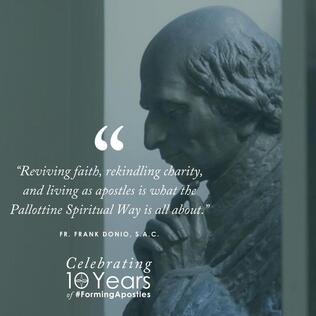 St. Vincent Pallotti, founder of the Union of Catholic Apostolate, the Society of the Catholic Apostolate (Pallottine Fathers and Brothers), and the Pallottine Sisters, whose feast day is on January 22, believed that all are called to be apostles, co-responsible for the mission of Christ and the Church. This was a rather radical understanding in the Rome of 1835.Today, it is central to the teaching of the Church, especially those of the Second Vatican Council, subsequent popes, and in the contemporary conversations about missionary discipleship and synodality. The members of the congregations of priests and brothers and sisters that Pallotti founded do not stand apart from the Union of Catholic Apostolate But are members of their own congregations and of the Union and share co-responsibly with lay people in leadership of the Union. Its mission is to“promote the co-responsibility of all the baptized to revive faith and rekindle charity in the Church and in the world, and to bring all to unity in Christ” (UAC General Statutes, n. 1). Reviving faith, rekindling charity, and living as apostles is what the Pallottine Spiritual Way is all about. To understand fully the mission and work of the Catholic Apostolate Center as we celebrate our 10th anniversary, it is important to know that it arises from and is always rooted in this spiritual way of being Church that Pallotti proposed and lived. The Center provides formation for living the mission of an apostle of Jesus Christ. Ultimately, all those who live as apostles of Christ are seeking not their own glory, but the infinite glory of God. For as Pallotti said: “Seek God and you will find God. Seek God in all things and you will find God in all things. Seek God always and you will find God always.” May the Charity of Christ urge us on! In God, the Infinite Love, Fr. Frank 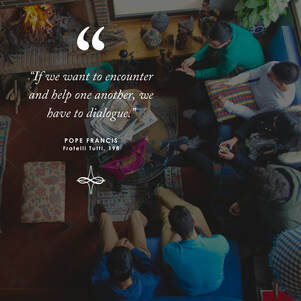 As with the Christian concept of love or charity, dialogue in a Christian context is focused on the other rather than oneself. As Pope Francis notes in number 198 of his Encyclical Fratelli Tutti, dialogue is a way of coming to know the other: “If we want to encounter and help one another, we have to dialogue.” To truly “encounter and help one another,” we need to deepen our presence more profoundly to the other through dialogue. Careful, patient, attentive, and compassionate listening to both the other person and to the Holy Spirit are needed. Bishop Séamus Freeman, S.A.C., who did much to further the Pallottine charism, would speak of this type of listening as a “trialogue” of each person involved and God. St. Vincent Pallotti understood this well when he focused great attention on the Upper Room or the Cenacle as the place of this type of listening, encounter, and discernment. It is worth our asking a few questions to review the quality of our trialogue. How am I engaging in trialogue? Am I simply having a dialogue, with no reference to God in the conversation? Is my dialogue focused on convincing the other of my point of view? Am I am offering my true thought and feeling to the other person or telling them what they want to hear? How open am I to deeper conversion of my understanding to one that is more aligned with what God is asking of me and the other person? There are no quick and easy answers to these questions. They require reflection in the context of prayer on experiences of dialogue and trialogue that we have. They also require openness to the Holy Spirit and a willingness to cooperate with the grace given by Christ. As we practice trialogue, we begin to see and experience the other person not as “other” but as another in the communal “journeying together” (Cf., Preparatory Document for the 16th Ordinary General Assembly of the Synod of Bishops, 11). May the Charity of Christ urge us on!
What does it mean to be a spiritual father? For me, the answer is found in the experience of fathers that I have known or know. Some are biological fathers, others are father-figures, such as older relatives and friends, priests, and religious brothers. Each in his own way showed me how to love in a fatherly way. Spiritual fatherhood is loving universally, not particularly. The love of Christ that urges us on is one that loves all, no matter what. That is not easy to do, and I fail more often at it than I succeed. The only way that spiritual fatherhood is possible is through cooperation with the grace of Christ. A spiritual father is one who is aware of the working of grace in his life and assists others in recognizing the movement of grace in their own. Good spiritual fatherhood does not just happen. Yes, for me, after ordination to the priesthood, people started to call me “Father.” It is true that one is configured to Christ in a unique way through the Sacrament of Holy Orders. Cooperation with the grace of the Sacrament is over a lifetime, though. One grows into spiritual fatherhood, even as a priest. In the first few years of priesthood, I tried to be of service to others by being present to them in their sorrow and their joy. The most profound moments were in listening and accompanying others. I learned not to say much, but simply to be with them, to walk with them as they deepened their life in Christ. Today, my approach to spiritual fatherhood is similar, but with the experience of walking with others sometimes for many years. I have found that they choose to be in such a relationship with me, not simply as a priest, but also as one who is a flawed follower of Christ. A good spiritual father does not claim perfection, but instead is very aware of his faults and failings, as well as the grace of Christ that is working in and through him. Pope Francis offers this consideration in Christus Vivit: “An especially important quality in mentors is the acknowledgement of their own humanity – the fact that they are human beings who make mistakes: not perfect people but forgiven sinners” (246). Good spiritual fathers are keenly aware that they are “forgiven sinners.” When that is forgotten by a spiritual father, then the focus becomes on self, not on Christ. He is the one who forgives sin and gives the grace to love unconditionally and universally for he, and he alone, is God, the Infinite Love. Click here to read more reflections on fatherhood during the Year of St. Joseph.
Social media has been gaining momentum in the Catholic world since the mid-2010s; however, since the COVID-19 pandemic began, digital evangelization and virtual faith-sharing have become even more important and prevalent. Because in-person liturgies, retreats, and daily interactions were not possible, Church organizations across the U.S. began to increase their digital footprint. Although the Catholic Apostolate Center has used technology and social media as tools for evangelization since its inception in 2011, the COVID-19 pandemic also led the Center to a greater focus on digital evangelization and online formation tools. As an intern with the Catholic Apostolate Center, my time has been punctuated by helping people encounter the Church and faith formation more positively. Specifically, expanding the Center’s courses on Catholic Faith Technologies’ e-learning platform and building an app for the Immaculate Conception Province of the Pallottine Fathers and Brothers has allowed me to create new ways for people to encounter Jesus Christ and learn more about Him. Pope Francis has followed the footsteps of his predecessors by encouraging the Church to continue evangelization over the internet. Our Holy Father has stressed the importance of using the technological means available to us today in order to proclaim the Gospel “to all the nations.” This evangelization can come in many ways and forms, and the Catholic Apostolate Center has embraced this understanding since its foundation. This summer, I have been working on adapting the Center’s “Apostles on Mission” in-person course to be an asynchronous course online with Catholic Faith Technologies’ e-learning platform. As a secondary education major, I was able to hone my skills as an educator by looking at the lesson outlines and plans and advising a break, an activity, or a different method of conveying the content to increase engagement. This project has also helped me look at what intellectual faith formation means and why it is so pertinent to the spiritual life. Formation in the Church calls us to learn more about Jesus, the Church, our Faith, and our own strengths and weaknesses. However, with the advent of the internet, we must cast the net over the right side of the boat, as Jesus calls us, to reach more people and continue to spread the Gospel message. Expanding digital resources for faith formation allows all the faithful to grow closer to our Lord. Digital evangelization can also allow for a more profound personal encounter with Jesus Christ. As seen throughout the pandemic, prayer resources can help people feel connected to the greater Church community. People want to experience various types of prayer to delve deeper into the spiritual life. The Catholic Apostolate Center has been working tirelessly this summer to create a prayer app for the Immaculate Conception Province of the Pallottine Fathers and Brothers. This app—entitled “Revive & Rekindle”—will assist the Pallottine community and the general faithful in growing closer to Christ through the spirituality of St. Vincent Pallotti. This project has allowed me to make two important observations about the Catholic faith. First, we must promote various forms of prayer and devotion to help the faithful find the styles of prayer that best suit them. Second, prayer and devotion must be disseminated and promoted in different media to spread the Gospel message to as many people as possible. The “Revive & Rekindle” app will allow people to grow closer to Jesus through reflections and prayers inspired by St. Vincent Pallotti, who urges us all to become Apostles for the Lord. As a strong proponent of the New Evangelization, Pope Francis encourages us to enter the digital landscape to encounter people and bring them closer to Christ. The Church can only do this through intentional formation and by promoting an encounter with Christ online. As an intern at the Catholic Apostolate Center, I have grown professionally, personally, and, most importantly, spiritually. Working with the Center, I have concretely realized what Pope Francis means when he urges young people not to “wait until tomorrow to contribute your energy, your audacity and your creativity to changing our world. Your youth is not an “in-between time” (Christus Vivit). A vast majority of people in the United States have social media, and since many Catholics are among this number, we have to preach the Gospel on all channels and encounter others and Jesus Himself through means of digital formation and evangelization. We must reach out to all corners of our world and society to be Apostles on mission for Jesus.
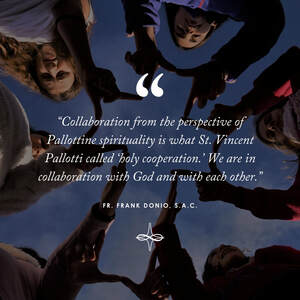 What is collaboration? Recently, during a virtual conference this question arose as it has many times in the past. People use the word, but often mean something different when they say it. For some, it is “collaboration for” –where everything is done by one person who then asks for others to help accomplish things. For others, it is “collaboration with” –which is akin to committee work, often led by one or two people, but others are asked for their opinion and input. Collaboration from the perspective of Pallottine spirituality is what St. Vincent Pallotti called “holy cooperation.” We are in collaboration with God and with each other. This form of collaboration is called “collaboration from the beginning.” Care is taken about who is present and a part of the process includes discernment. The group discerns together in “trialogue” –the Holy Spirit and the group – the issue at hand, a way forward, and then moves together. This way is that of the Cenacle, the Upper Room in Jerusalem, where the early community of the Church discerned together. It is the way of the Sent! Moving forth from the Cenacle for Christ, each with a role, all co-responsible for the mission of Christ and the Church! Some may see this way as idealistic and unachievable. For human beings alone, it is. With the grace of God, though, “all things are possible” (Mt. 19:26). May the Charity of Christ urge us on! Click here to learn more about Pallottine Spirituality. Click here to learn more about Collaboration in Ministry.
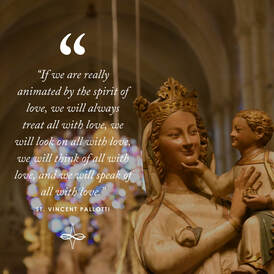 What motivates us to do what we do? If it is love, then we are called to “will the good of another” (St. Thomas Aquinas quoted in the Catechism of the Catholic Church, 1766). The object of our love is not ourselves or our self-interest. It is God and neighbor. St. Vincent Pallotti universalizes love in this way: “If we are really animated by the spirit of love, we will always treat all with love, we will look on all with love, we will think of all with love, and we will speak of all with love” (OOCC III, 338). This type of love requires sacrifice and generosity. Of course, the greatest act of love was the sacrifice of Christ on the Cross. We see generosity and sacrifice in the Blessed Virgin Mary saying “yes” to the Angel Gabriel and St. Joseph setting aside what he wanted to do and always doing the will of God. Sacrificing ourselves for the other, thinking not of self, but the other, is not a typical way of behaving. We seem to be able to do it on a small scale with those closest to us, which is the place to start. Bit by bit, through self-sacrifice, a generosity of spirit grows, love grows. Does this happen on its own? No, the Holy Spirit is moving in and through each of us. The grace of God gives us the ability to sacrifice and be generous, moving us toward universal love. May the charity of Christ urge us on!
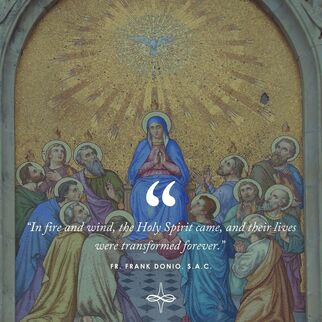 We are in the time of the Upper Room, the Cenacle. The days between the Ascension of the Lord and Pentecost are liturgically the time when the Blessed Virgin Mary, the Apostles, and the disciples were together in prayer, awaiting the coming of the Holy Spirit. They did not really know what to expect. In fire and wind, the Holy Spirit came, and their lives were transformed forever. The world is also transformed and is transforming. The mission continues in the name of Jesus Christ! We are sent as apostles, as missionary disciples, out into the world. Hiding in a room, in our homes, even in a church is not our call. Instead, we go forth, going where the Holy Spirit moves us to go. We can do amazing things in the name of Jesus Christ. There is no need to wait until someone invites us. No, if we are baptized, and especially if we are confirmed, then we can go forth! We need to recognize, though, that we do not send ourselves. We are sent by Christ, in and through his Church. The community of faith that we call Church is where we go forth from and to which we return. The Church teaches us, forms us, heals and nourishes us through the Sacraments, and sends us on mission. The mission is not ours; it is Christ’s. We, as members of Christ’s Faithful, are called to live his mission until he comes again, just as the Apostles were told to do. In all of this, Mary, Queen of Apostles, is with us as our Mother and Queen. Her feast day is the day before Pentecost. She was the perfect disciple of Christ. St. Vincent Pallotti said of her: “We have most holy Mary, after Jesus Christ, the most perfect model of true apostolic zeal, and of perfect love” (OOCC I, 7). The Decree on the Apostolate of the Laity of the Second Vatican Council echoes this sentiment of Pallotti: “The perfect example of this type of spiritual and apostolic life is the most Blessed Virgin Mary, Queen of Apostles, who while leading the life common to all here on earth, one filled with family concerns and labors, was always intimately united with her Son and in an entirely unique way cooperated in the work of the Savior… All should devoutly venerate her and commend their life and apostolate to her maternal care” (4). Mary, Queen of Apostles, pray for us! May the charity of Christ urge us on! To learn more about Mary, Queen of Apostles, please click here.
Next week is Holy Week. Before we arrive there and enter the most solemn of days of the Church year, the Easter Triduum, we come to another Solemnity during the Lenten season. Last week, it was the Solemnity of St. Joseph, spouse of the Blessed Virgin Mary and patron of the Universal Church. Tomorrow, it is the Solemnity of the Annunciation of the Lord. Both offer us examples of how to respond to God’s action in our lives. The Blessed Virgin Mary and St. Joseph responded freely and fully to God’s invitation announced by the angel to move in directions that they did not expect. While we may not have an angel announcing God’s will for us, in what ways do we discern the direction that we are called to take? Recently, I attended the religious profession of a Benedictine monk who is a former student of mine. Some of those who attended the Mass and profession ceremony in support of him were also former students who are now either diocesan or religious priests or married with children. (Some are also former staff members and collaborators of the Center.) Each in their own way has followed God’s invitation to them. In and through their chosen vocations, they have found joy in living more deeply their Christian life.. While they have found joy, they also know what it means to take up the cross and follow Jesus Christ as his disciples. None of them made the choices that they did easily, but did so through cooperation with the grace of Christ. We are called to the same. Holy Week offers us an important opportunity to reflect, discern, and act on God’s will in our lives. Join us on social media for our Virtual Holy Week retreat. We offer it as a way of doing this type of discernment in the context of this most solemn time. Please know that our prayers are with you, especially during the Easter Triduum and season. May the charity of Christ urge us on!
|
Details
Archives
July 2024
Categories
All
|
About |
Media |
© COPYRIGHT 2024 | ALL RIGHTS RESERVED






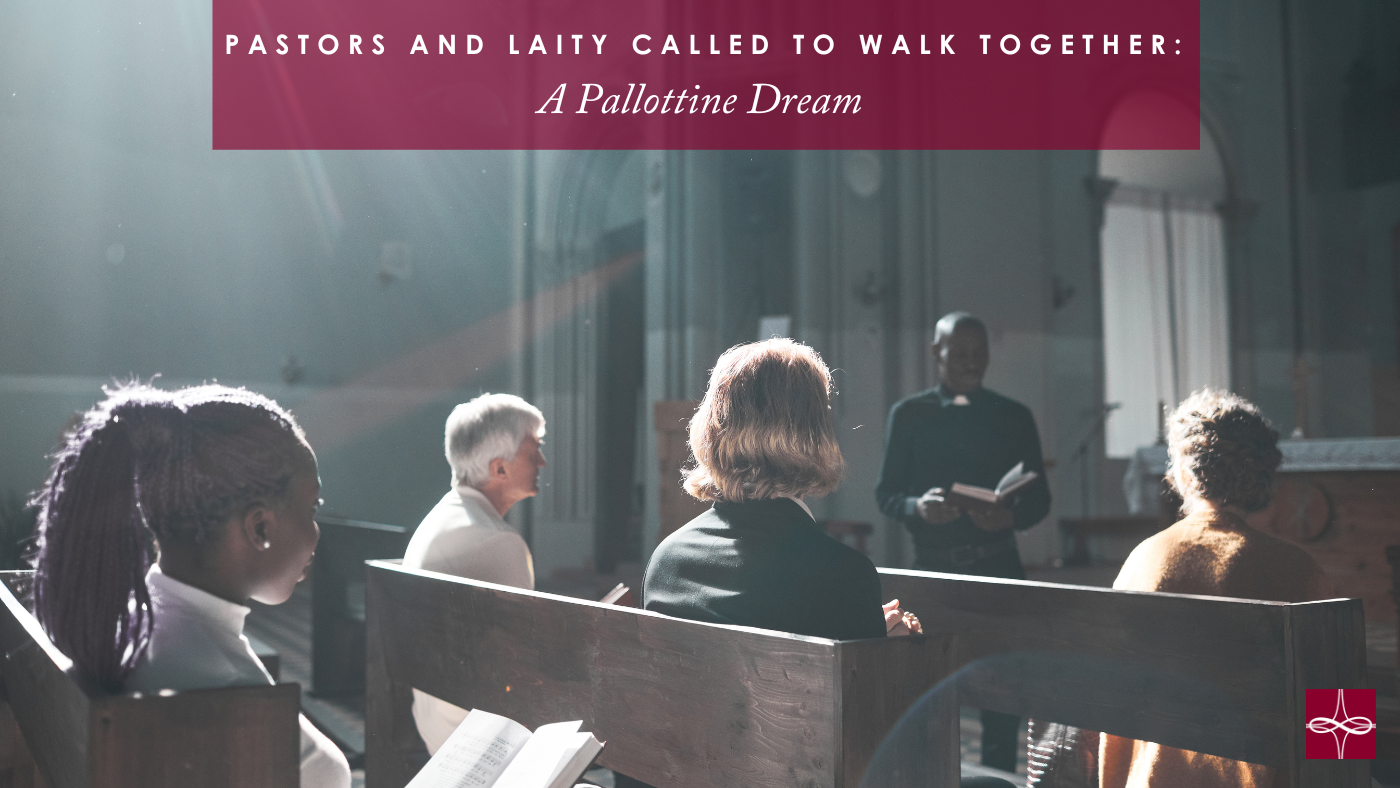
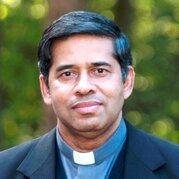
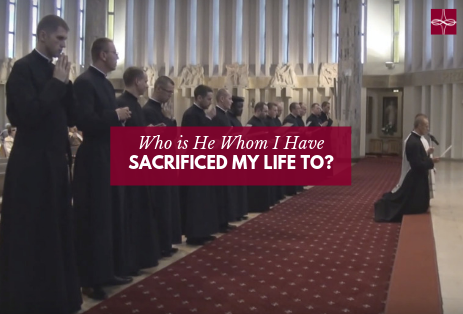
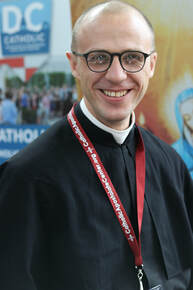
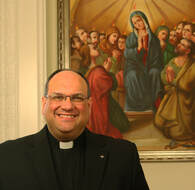
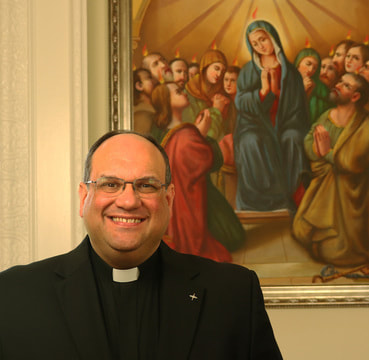
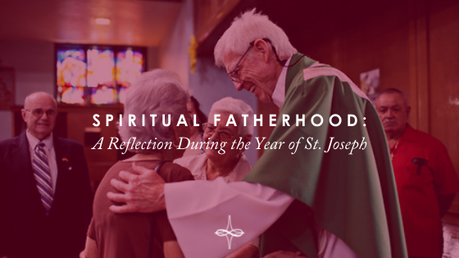

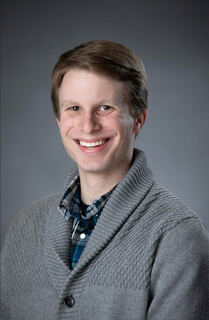
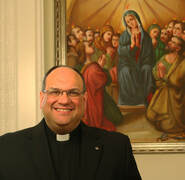
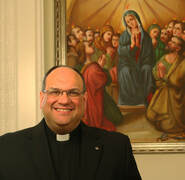
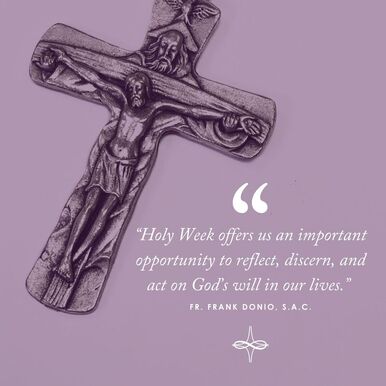
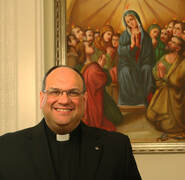
 RSS Feed
RSS Feed